1
He loved her because it was his nature to do so, but there were times when he could not endure her love for him. There were times when it became nothing but pure idiot mystery...Flannery OConnor
2
Where you come from is gone, where you thought you were going to was never there, and where you are is no good unless you can get away from it. Where is there a place for you to be? No place... Nothing outside you can give you any place... In yourself right now is all the place you've got.Flannery OConnor

3
Accepting oneself does not preclude an attempt to become better.Flannery OConnor

4
Everywhere I go I'm asked if I think the university stifles writers. My opinion is that they don't stifle enough of them. There's many a best-seller that could have been prevented by a good teacher.Flannery OConnor

5
I don't deserve any credit for turning the other cheek as my tongue is always in it.Flannery OConnor
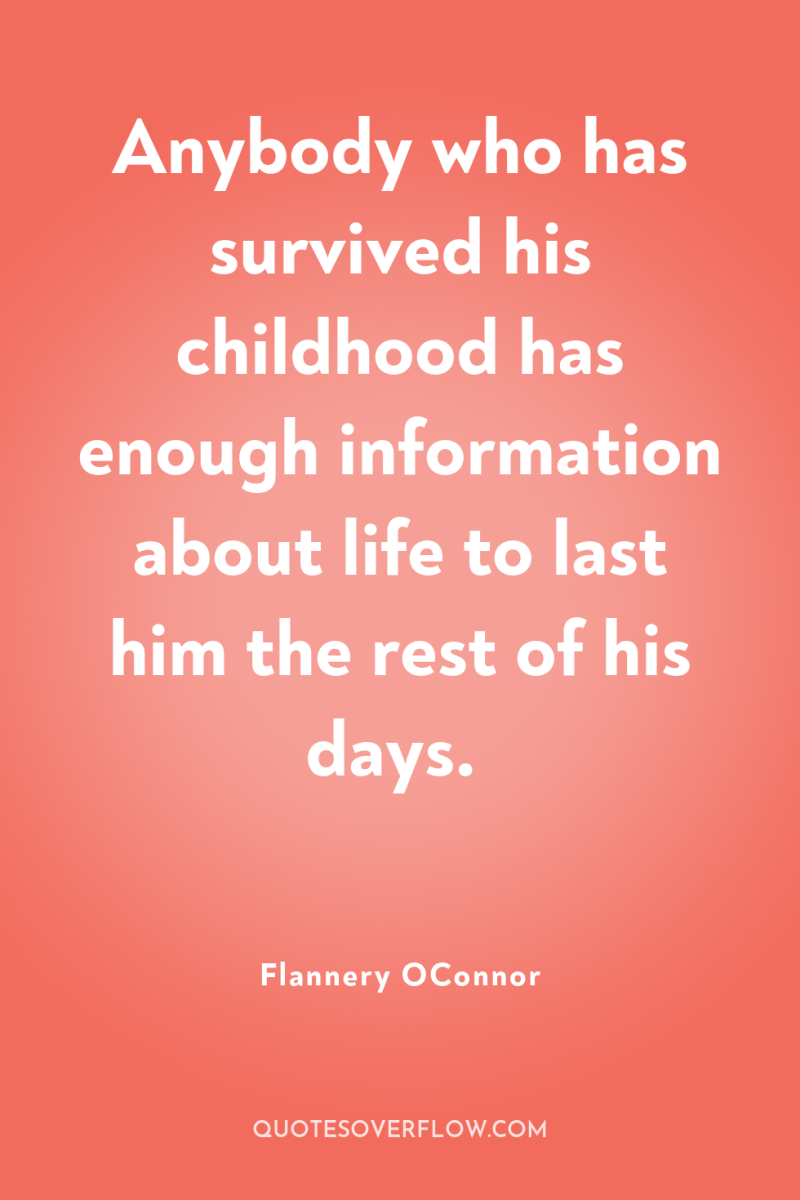
6
Anybody who has survived his childhood has enough information about life to last him the rest of his days.Flannery OConnor

7
She would've been a good woman, " said The Misfit, "if it had been somebody there to shoot her every minute of her life.Flannery OConnor

8
Total non-retention has kept my education from being a burden to me.Flannery OConnor
9
If you live today, you breath in nihilism ... it's the gas you breathe. If I hadn't had the Church to fight it with or to tell me the necessity of fighting it, I would be the stinkingest logical positivist you ever saw right now.Flannery OConnor
10
Most of us have learned to be dispassionate about evil, to look it in the face and find, as often as not, our own grinning reflections with which we do not argue, but good is another matter. Few have stared at that long enough to accept that its face too is grotesque, that in us the good is something under construction. The modes of evil usually receive worthy expression. The modes of good have to be satisfied with a cliche or a smoothing down that will soften their real look. .Flannery OConnor
11
You know, " Daddy said, "it's some that can live their whole life out without asking about it and it's others has to know why it is, and this boy is one of the latters. He's going to be into everything!Flannery OConnor
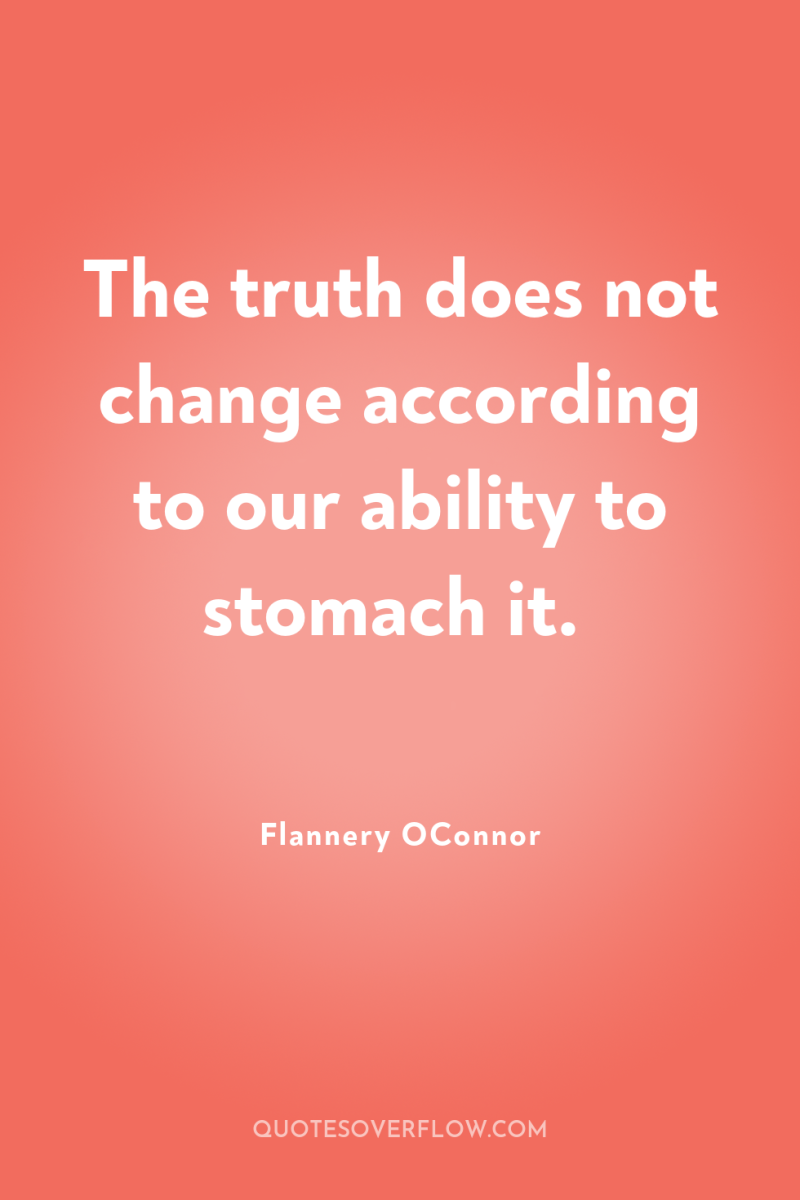
12
The truth does not change according to our ability to stomach it.Flannery OConnor
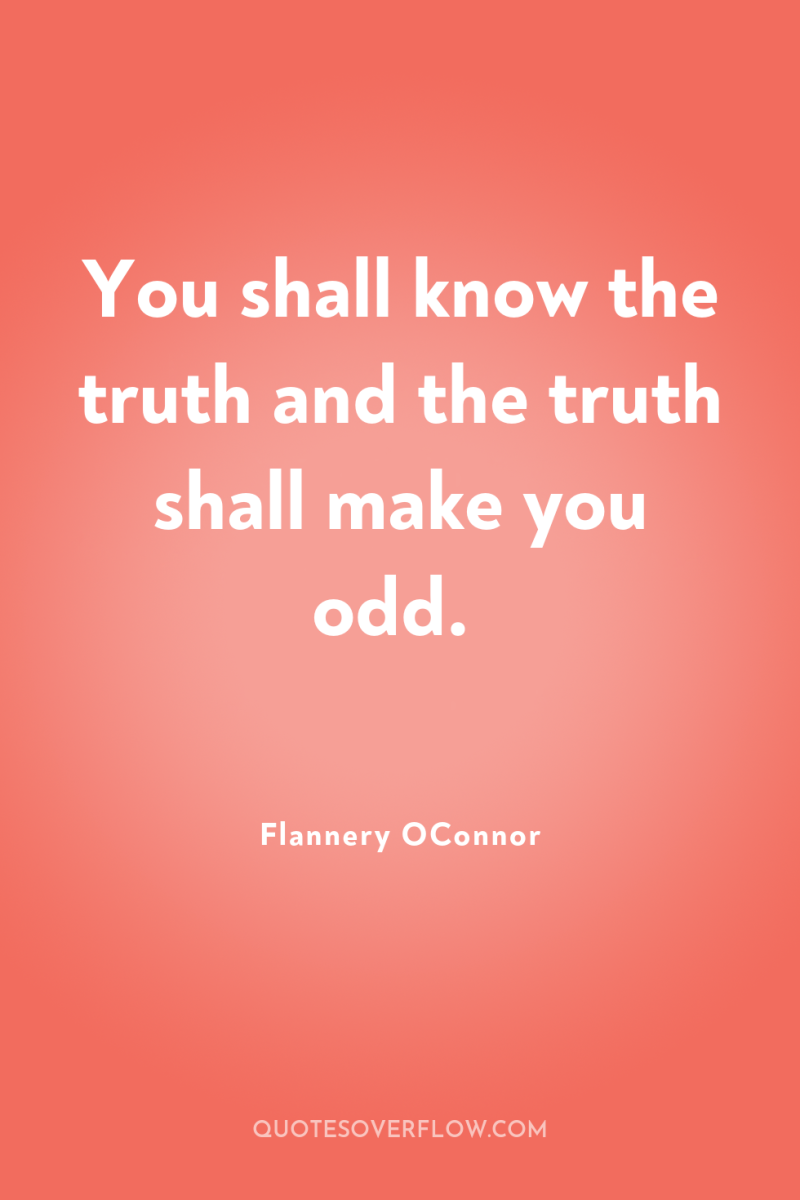
13
You shall know the truth and the truth shall make you odd.Flannery OConnor
14
I preach there are all kinds of truth, your truth and somebody else's, but behind all of them, there's only one truth and that is that there is no truth.. No truth behind all truths is what I and this church preach! Where you come from is gone, where you thought you were going to never was there, and where you are is no good unless you can get away from it. Where is there a place for you to be? No place.. In yourself right now is all the place you've got. .Flannery OConnor
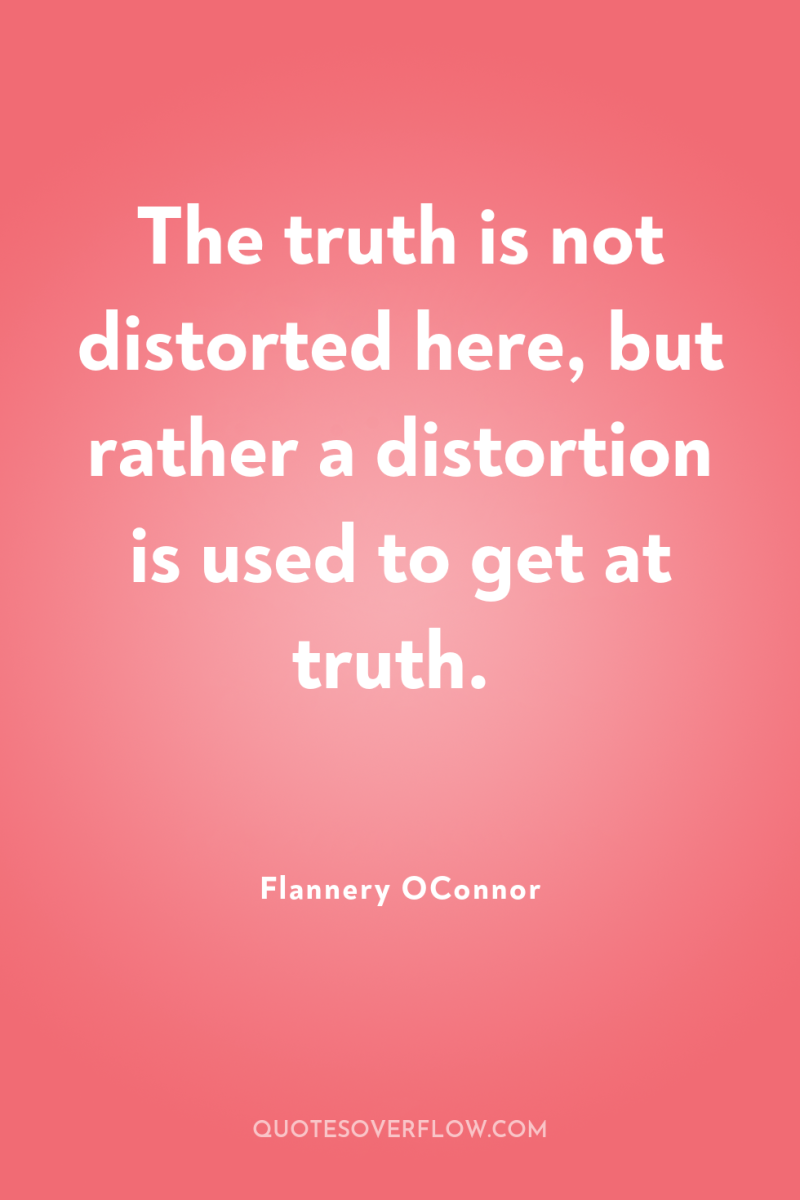
15
The truth is not distorted here, but rather a distortion is used to get at truth.Flannery OConnor

16
When there is a tendency to compartmentalize the spiritual and make it resident in a certain type of life only, the spiritual is apt gradually to be lost.Flannery OConnor
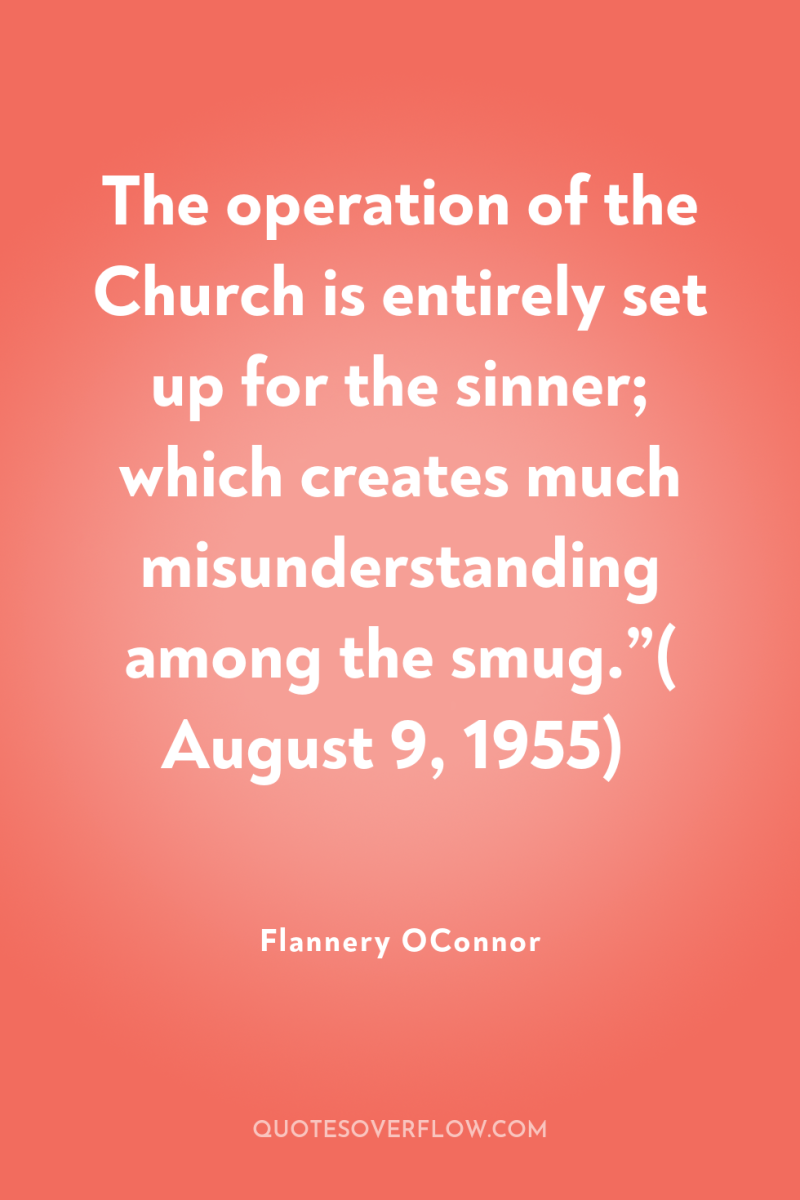
17
The operation of the Church is entirely set up for the sinner; which creates much misunderstanding among the smug.”( August 9, 1955)Flannery OConnor

18
People without hope not only don't write novels, but what is more to the point, they don't read them.Flannery OConnor
19
We live in an unbelieving age but one which is markedly and lopsidedly spiritual. There is one type of modern man who recognizes spirit in himself but who fails to recognize a being outside himself whom he can adore as Creator and Lord; consequently he has become his own ultimate concern. He says with Swinburne, "Glory to man in the highest, for he is the master of things, " or with Steinbeck, "In the end was the word and the word was with men." For him, man has his own natural spirit of courage and dignity and pride and must consider it a point of honor to be satisfied with this. There is another type of modern man who recognizes a divine being not himself, but who does not believe that this being can be known anagogically or defined dogmatically or received sacramentally. Spirit and matter are separated for him. Man wanders about, caught in a maze of guilt he can't identify, trying to reach a God he can't approach, a God powerless to approach him. And there is another type of modern man who can neither believe nor contain himself in unbelief and who searches desperately, feeling about in all experience for the lost God. .Flannery OConnor
20
It is when the individual's faith is weak, not strong, that he will be afraid of an honest fictional representation of life; and when there is a tendency to compartmentalize the spiritual and make it resident in a certain type of life only, the supernatural is apt gradually to be lost.Flannery OConnor
21
Writing a novel is a terrible experience, during which the hair often falls out and the teeth decay. I'm always irritated by people who imply that writing fiction is an escape from reality. It is a plunge into reality and it's very shocking to the system.Flannery OConnor
22
There is something in us, as storytellers and as listeners to stories, that demands the redemptive act, that demands that what falls at least be offered the chance to be restored. The reader of today looks for this motion, and rightly so, but what he has forgotten is the cost of it. His sense of evil is diluted or lacking altogether, and so he has forgotten the price of restoration. When he reads a novel, he wants either his sense tormented or his spirits raised. He wants to be transported, instantly, either to mock damnation or a mock innocence.Flannery OConnor
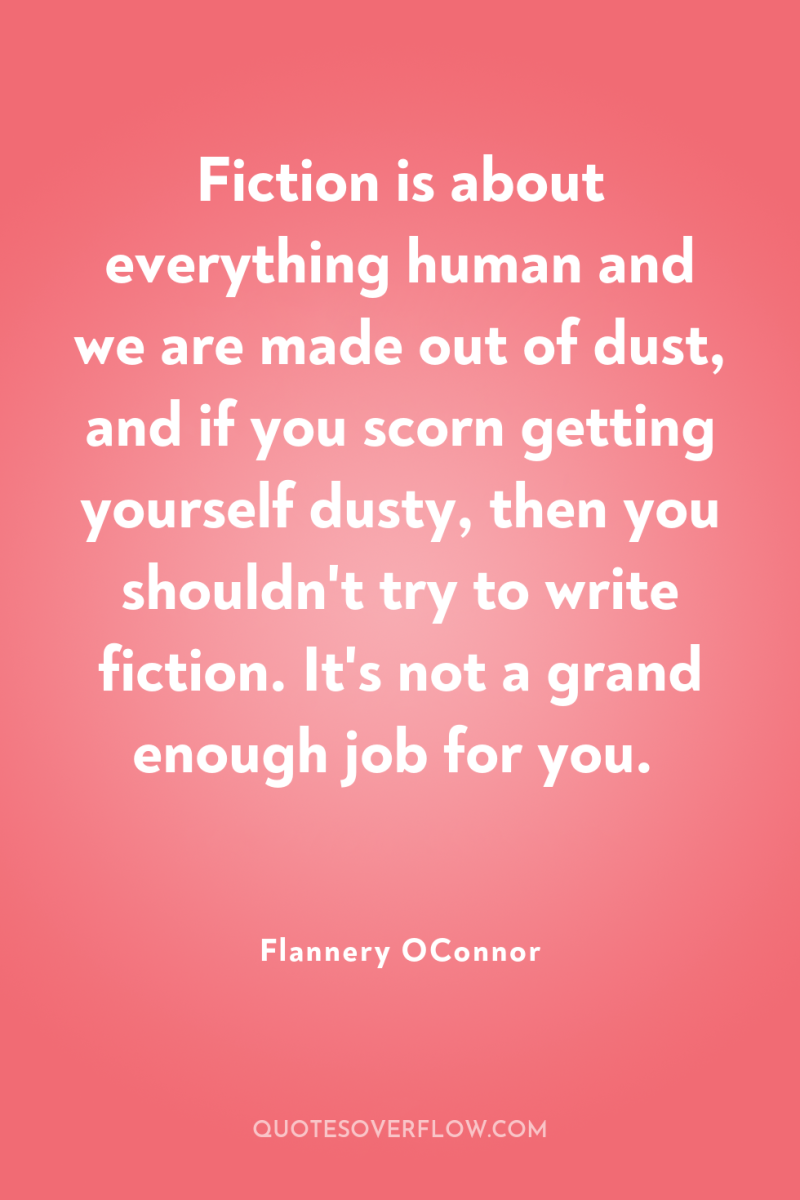
23
Fiction is about everything human and we are made out of dust, and if you scorn getting yourself dusty, then you shouldn't try to write fiction. It's not a grand enough job for you.Flannery OConnor
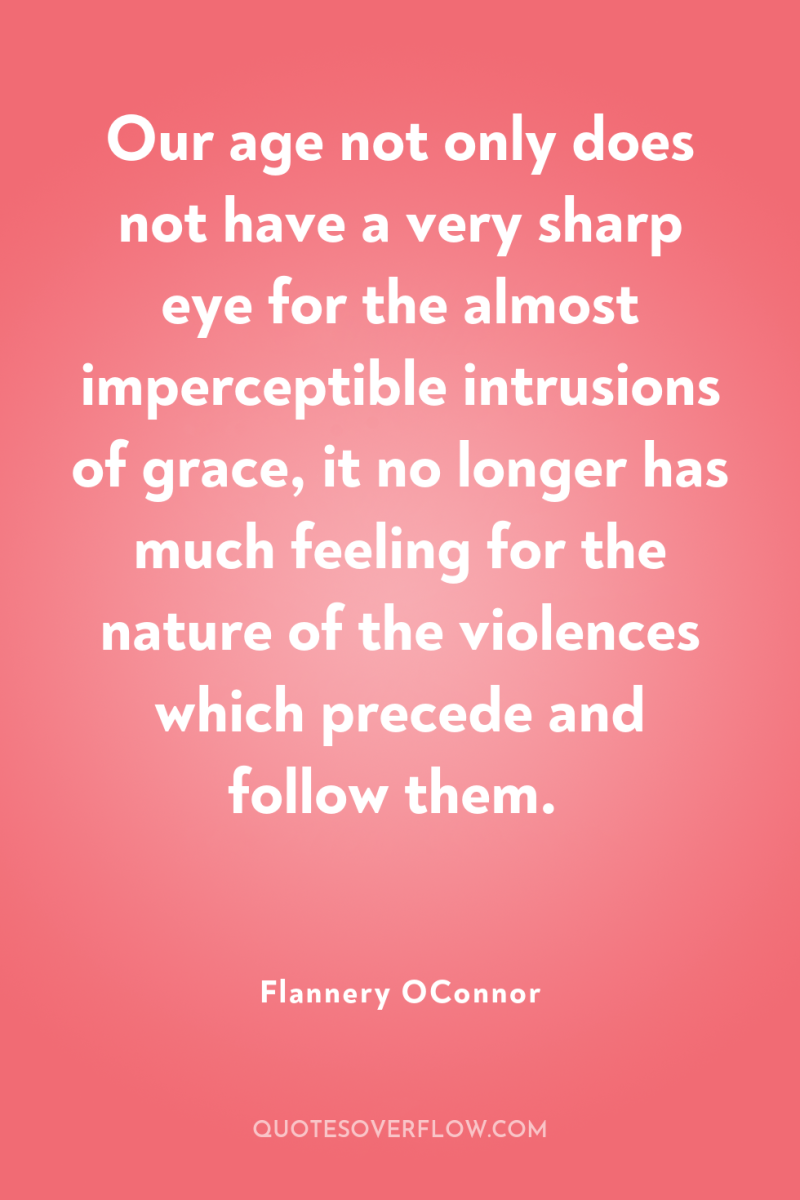
24
Our age not only does not have a very sharp eye for the almost imperceptible intrusions of grace, it no longer has much feeling for the nature of the violences which precede and follow them.Flannery OConnor
25
There is no excuse for anyone to write fiction for public consumption unless he has been called to do so by the presence of a gift. It is the nature of fiction not to be good for much unless it is good in itself.Flannery OConnor
26
I have found, in short, from reading my own writing, that my subject in fiction is the action of grace in territory largely held by the devil. I have also found that what I write is read by an audience which puts little stock either in grace or the devil. You discover your audience at the same time and in the same way that you discover your subject, but it is an added blow.Flannery OConnor

27
Everywhere I go, I am asked if I think university stifles writers. My opinion is that it doesn't stifle enough of them.Flannery OConnor
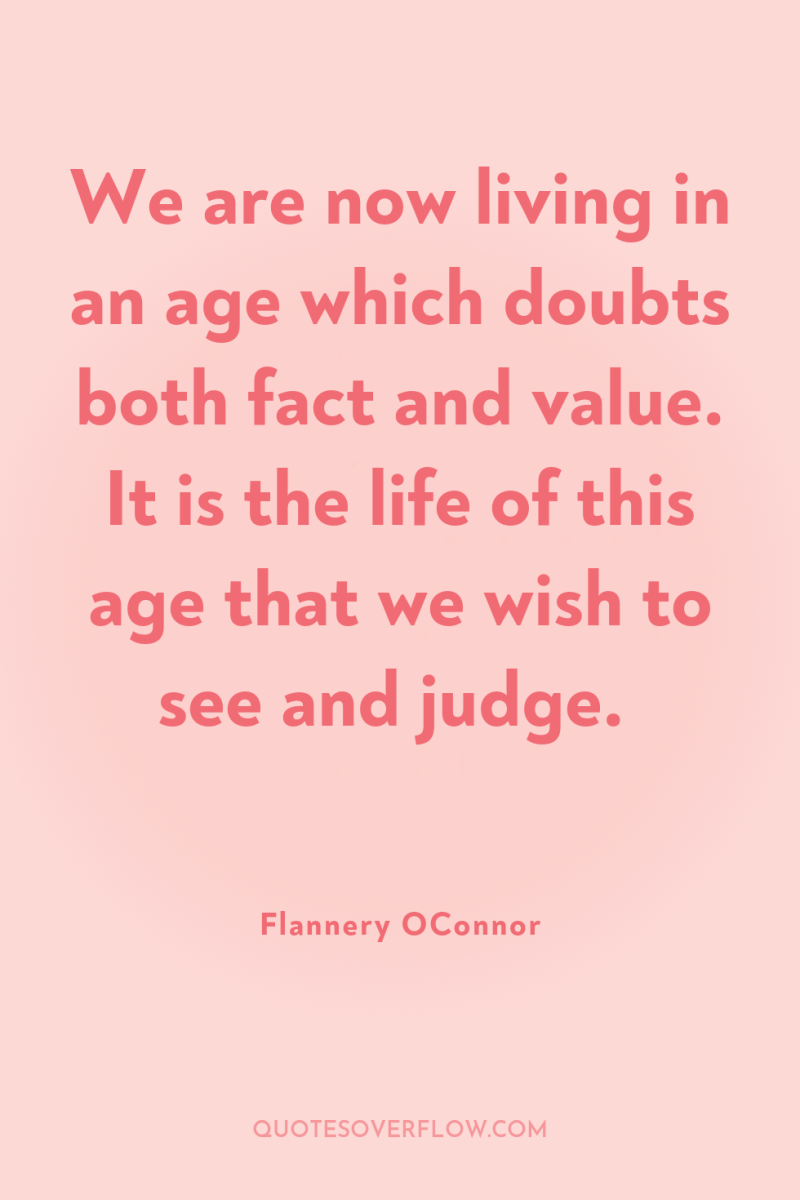
28
We are now living in an age which doubts both fact and value. It is the life of this age that we wish to see and judge.Flannery OConnor
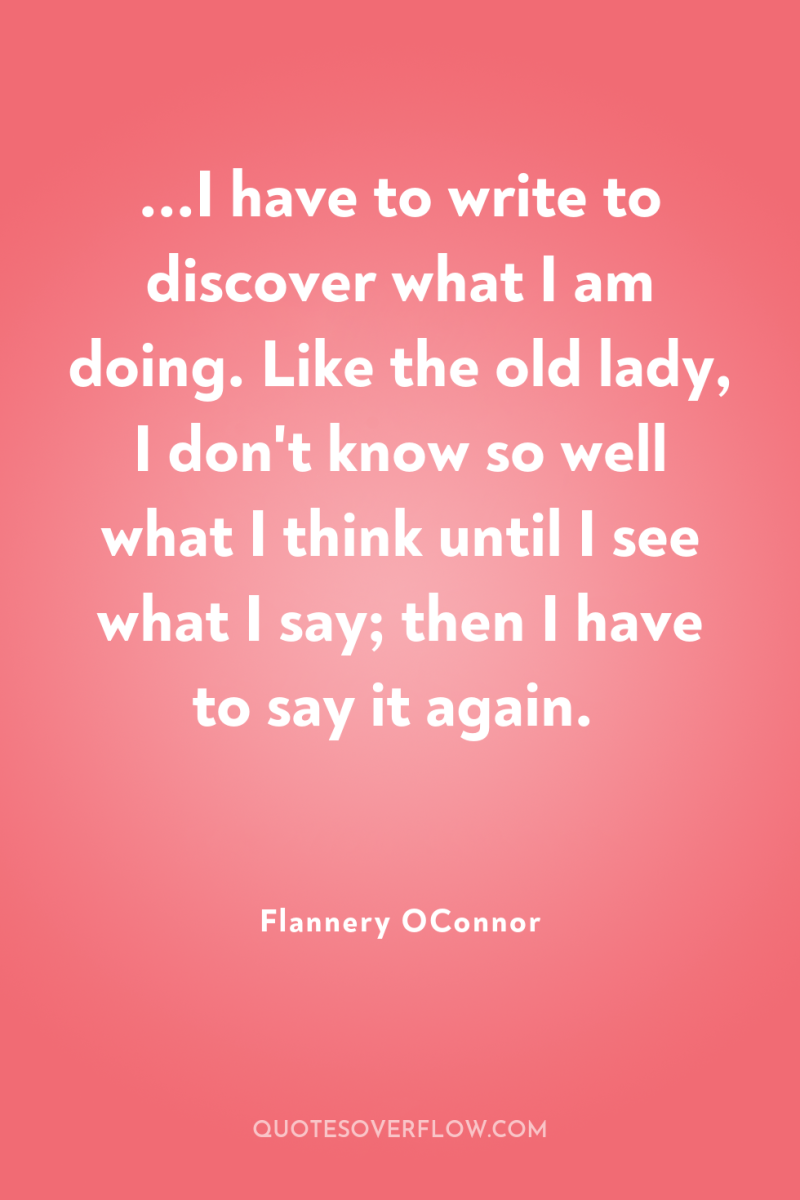
29
...I have to write to discover what I am doing. Like the old lady, I don't know so well what I think until I see what I say; then I have to say it again.Flannery OConnor
30
Wise Blood was written by an author congenitally innocent of theory, but one with certain preoccupations. That belief in Christ is to some a matter of life and death has been a stumbling block for readers who would prefer to think it a matter of no great consequence. For them Hazel Motes' integrity lies in his trying with such vigor to get rid of the ragged figure who moves from tree to tree in the back of his mind. For the author Hazel's integrity lies in his not being able to. Does one's integrity ever lie in what he is not able to do? I think that usually it does, for free will does not mean one will, but many wills conflicting in one man. Freedom cannot be conceived simply. It is a mystery and one which a novel, even a comic novel, can only be asked to deepen. .Flannery OConnor
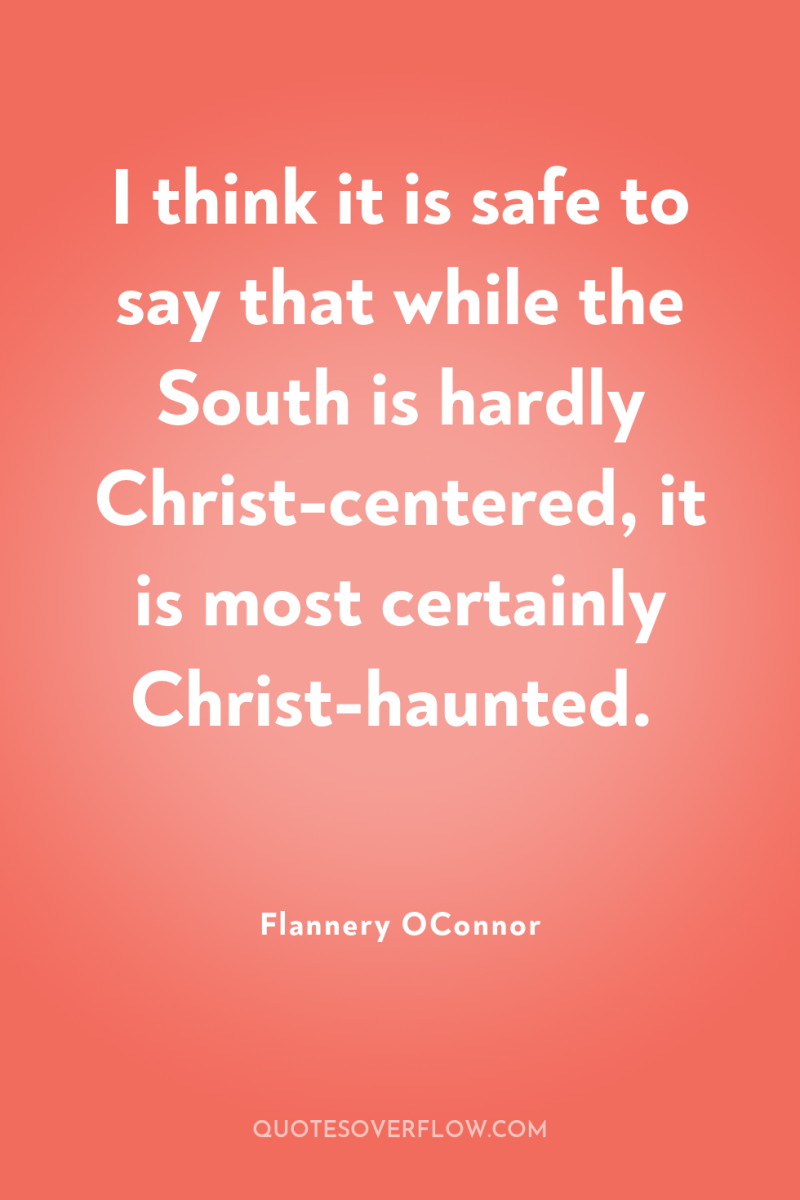
31
I think it is safe to say that while the South is hardly Christ-centered, it is most certainly Christ-haunted.Flannery OConnor
32
The Catholic novelist in the South will see many distorted images of Christ, but he will certainly feel that a distorted image of Christ is better than no image at all. I think he will feel a good deal more kinship with backwoods prophets and shouting fundamentalists than he will with those politer elements for whom the supernatural is an embarrassment and for whom religion has become a department of sociology or culture or personality development.Flannery OConnor
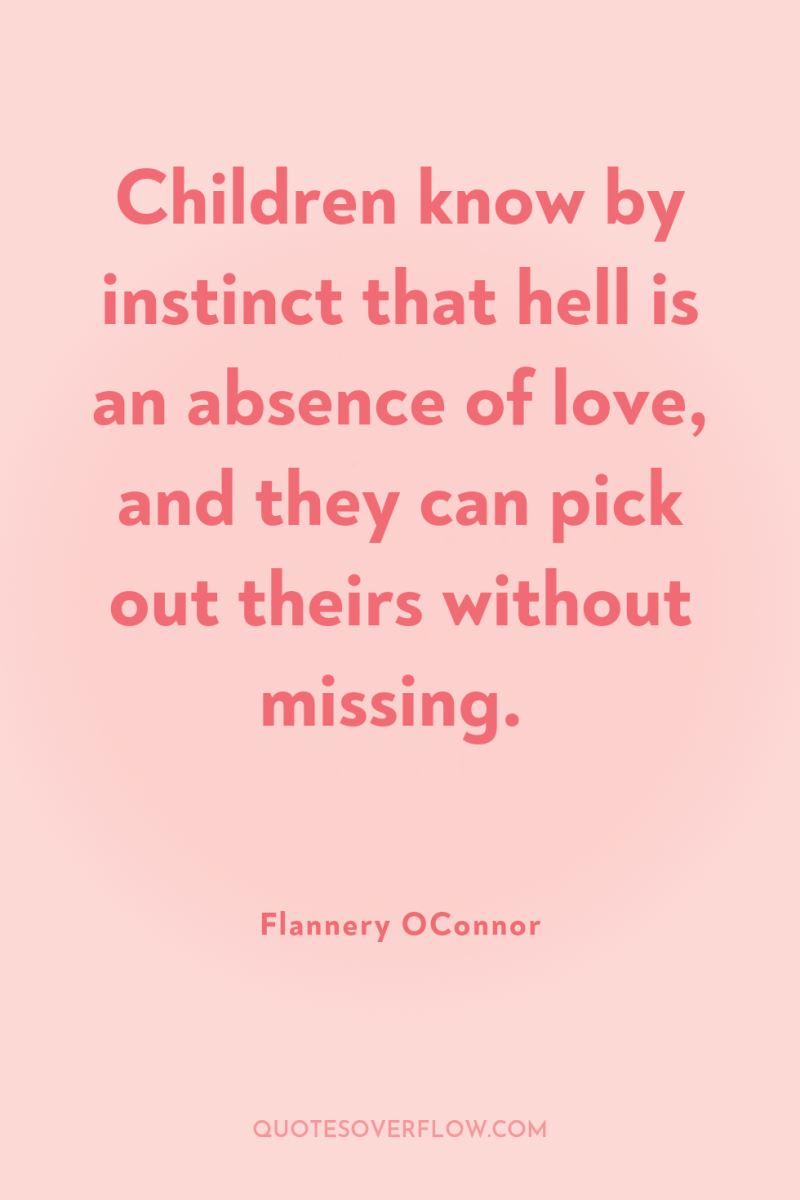
33
Children know by instinct that hell is an absence of love, and they can pick out theirs without missing.Flannery OConnor

34
Your beliefs will be the light by which you see, but they will not be what you see and they will not be a substitute for seeing.Flannery OConnor
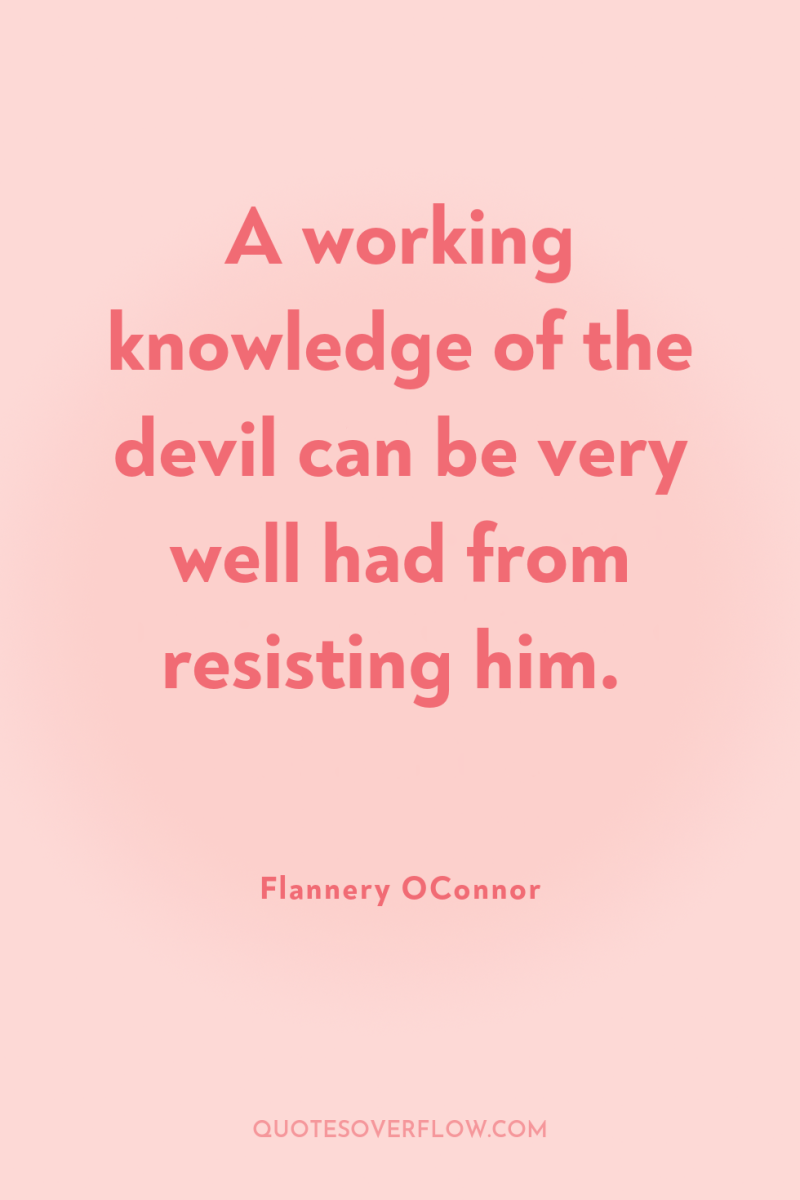
35
A working knowledge of the devil can be very well had from resisting him.Flannery OConnor

36
If you want to get anywhere in religion, you got to keep it sweet.Flannery OConnor

37
She had observed that the more education they got, the less they could do. Their father had gone to a one-room schoolhouse through the eighth grade and he could do anything.Flannery OConnor
38
The meaning of a story should go on expanding for the reader the more he thinks about it, but meaning cannot be captured in an interpretation. If teachers are in the habit of approaching a story as if it were a research problem for which any answer is believable so long as it is not obvious, then I think students will never learn to enjoy fiction. Too much interpretation is certainly worse than too little, and where feeling for a story is absent, theory will not supply it.Flannery OConnor

39
The boy knew that escaping school was the surest sign of his election.Flannery OConnor
40
I don't know which is worse–to have a bad teacher or no teacher at all. In any case, I believe the teacher's work should be largely negative. He can't put the gift into you, but if he finds it there, he can try to keep it from going in an obviously wrong direction. We can learn how not to write, but this is a discipline that does not simply concern writing itself but concerns the whole intellectual life. A mind cleared of false emotion and false sentiment and egocentricity is going to have at least those roadblocks removed from its path. If you don't think cheaply, then there at least won't be the quality of cheapness in your writing, even though you may not be able to write well. The teacher can try to weed out what is positively bad, and this should be the aim of the whole college. Any discipline can help your writing: logic, mathematics, theology, and of course and particularly drawing. Anything that helps you to see, anything that makes you look. The writer should never be ashamed of staring. There is nothing that doesn't require his attention.Flannery OConnor
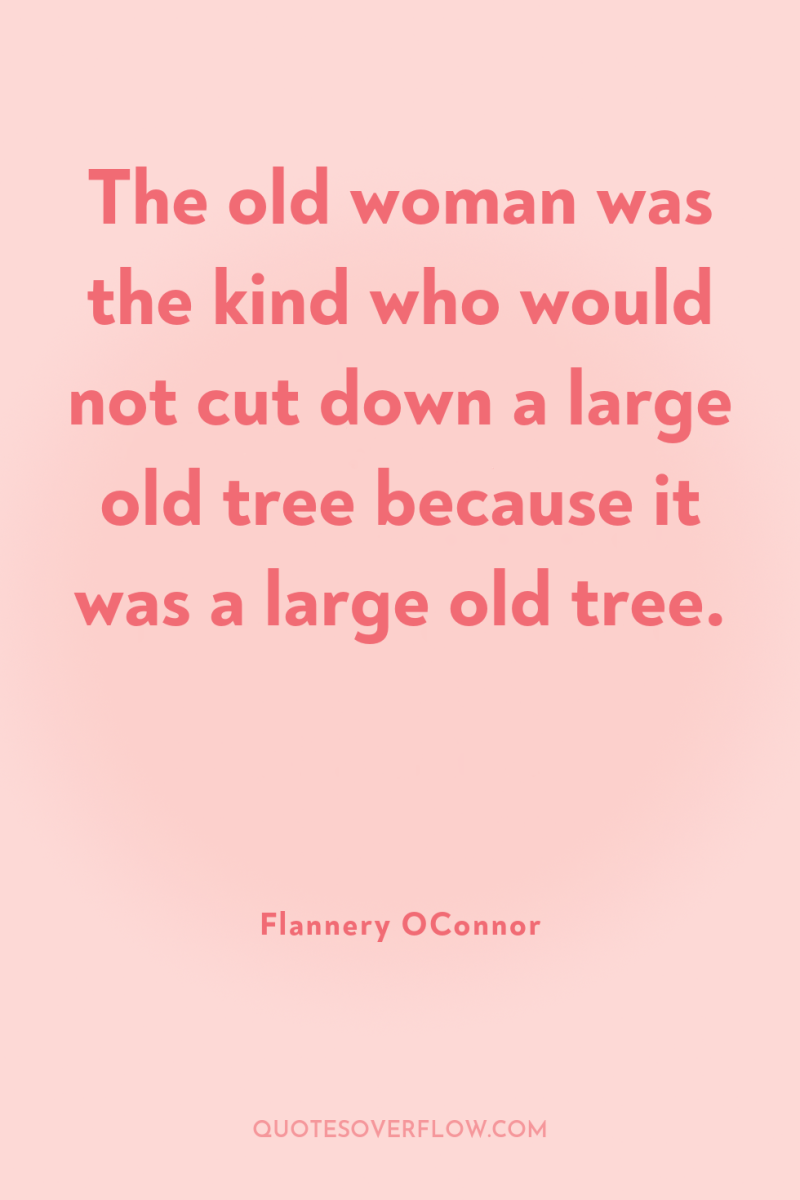
41
The old woman was the kind who would not cut down a large old tree because it was a large old tree.Flannery OConnor
42
He and the girl had almost nothing to say to each other. One thing he did say was, 'I ain't got any tattoo on my back.'' What you got on it?' the girl said.' My shirt, ' Parker said. 'Haw.''Haw, haw, ' the girl said politely.Flannery OConnor

43
No one can be an atheist who does not know all things. Only God is an atheist.Flannery OConnor
44
To the person who believes this- as the western world did up until a few centuries ago- this physical, sensible world is good because it proceeds from a divine source. The artist usually knows this by instinct; his senses, which are used to penetrating the concrete, tell him so. When Conrad said that his aim as an artist was to render the highest possible justice to the visible universe, he was speaking with the novelist's surest instinct. The artist penetrates the concrete world in order to find at its depths the image of its source, the image of ultimate reality. This in no way hinders his perception of evil but rather sharpens it, for only when the natural world is seen as good does evil become intelligible as a destructive force and a necessary result of our freedom.Flannery OConnor
45
Where you come from is gone, where you thought you were going to never was there, and where you are is no good unless you can get away from it. Where is there a place for you to be? No place. Nothing outside you can give you any place, " he said. "You needn't look at the sky because it's not going to open up and show no place behind it. You needn't to search for any hole in the ground to look through into somewhere else. You can't go neither forwards nor backwards into your daddy's time nor your children's if you have them. In yourself right now is all the place you've got. If there was any Fall, look there, if there was any Redemption, look there, and if you expect any Judgment, look there, because they all three will have to be in your time and your body and where in your time and your body can they be? .Flannery OConnor
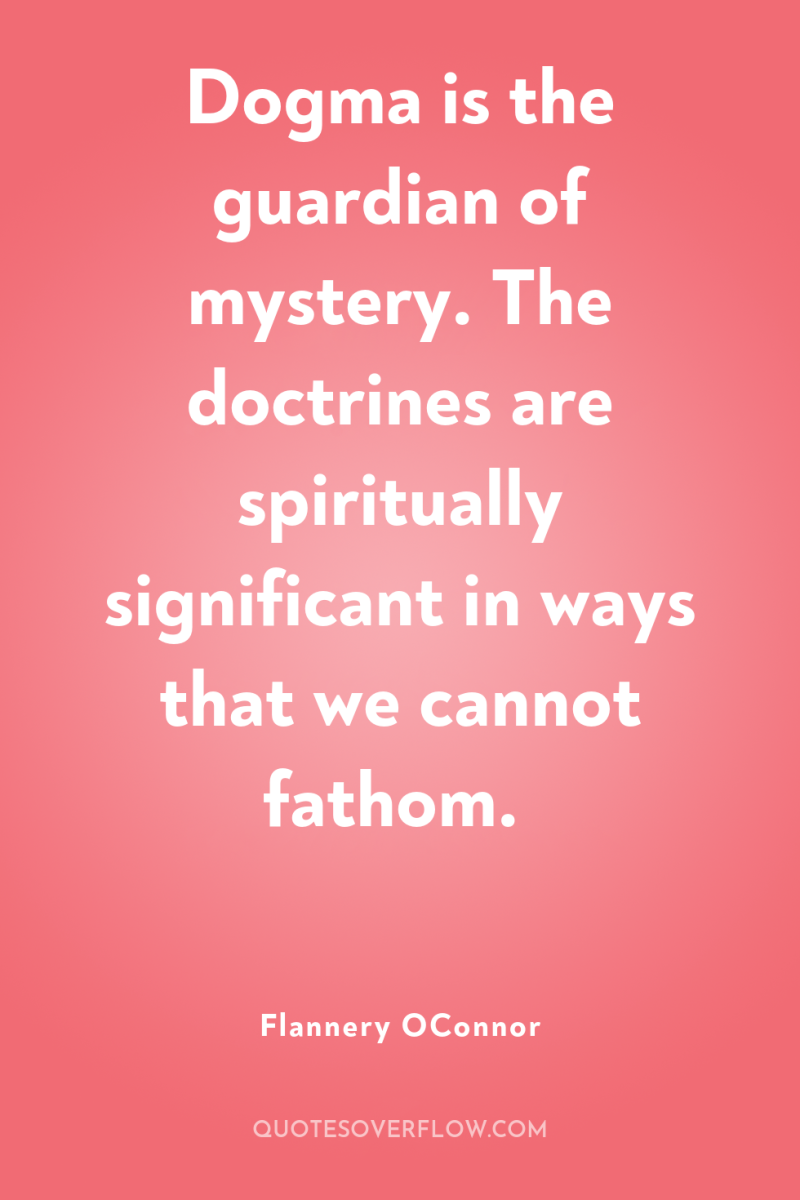
46
Dogma is the guardian of mystery. The doctrines are spiritually significant in ways that we cannot fathom.Flannery OConnor
47
Leave! ’ Hazel Motes cried. ‘Go ahead and leave! The truth don’t matter to you. Listen, ’ he said, pointing his finger at the rest of them, ‘the truth don’t matter to you. If Jesus had redeemed you, what difference would it make to you? You wouldn’t do nothing about it. Your faces wouldn’t move, neither this way nor that, and if it was three crosses there and Him hung on the middle one, that wouldn’t mean no more to you and me than the other two. Listen here. What you need is something to take the place of Jesus, something that would speak plain. The Church Without Christ don’t have a Jesus but it needs one! It needs a new jesus! It needs one that’s all man, without blood to waste, and it needs one that don’t look like any other man so you’ll look at him. Give me such a jesus, you people. Give me such a new jesus and you’ll see how far the Church Without Christ can go!.Flannery OConnor
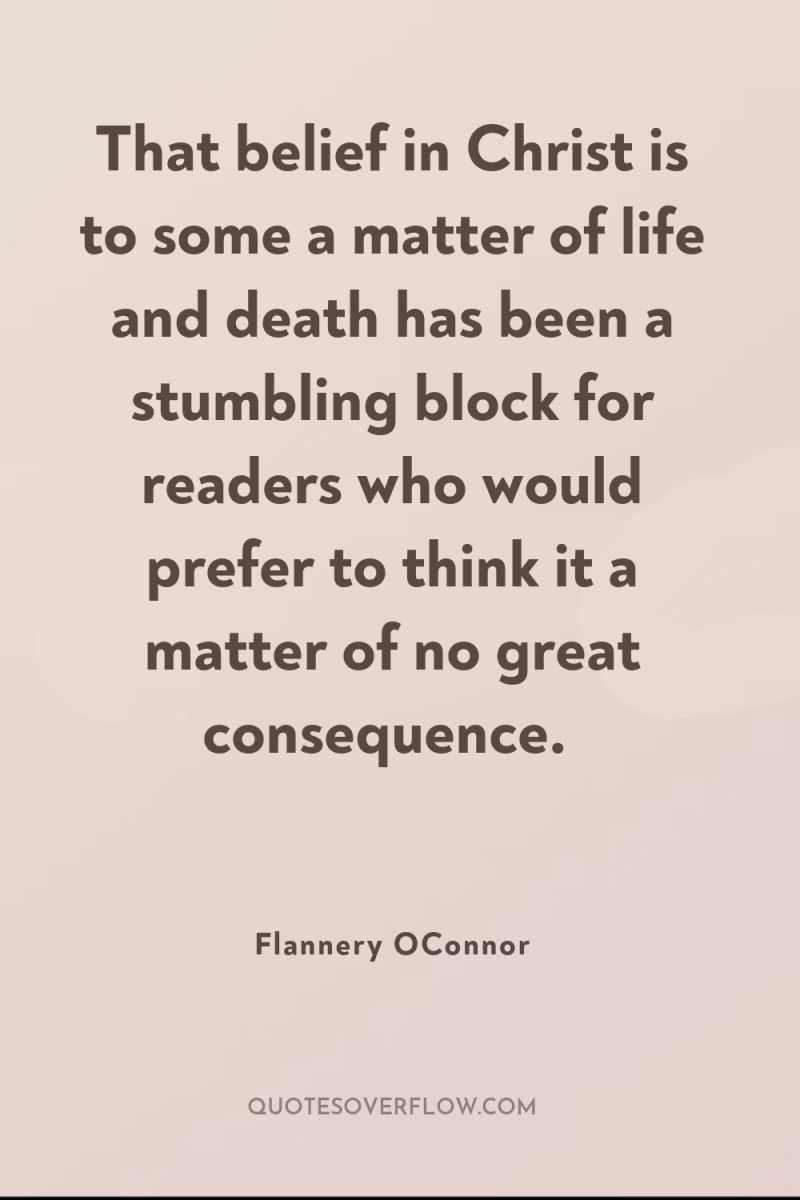
48
That belief in Christ is to some a matter of life and death has been a stumbling block for readers who would prefer to think it a matter of no great consequence.Flannery OConnor
49
His friends told him that nobody was interested in his goddam soul unless it was the priest and he managed to answer that no priest taking orders from no pope was going to tamper with his soul. They told him he didn't have any soul and left for the brothel. He took a long time to believe them because he wanted to believe them. All he wanted was to believe them and get rid of it once and for all, and he saw opportunity here to get rid of it without corruption, to be converted to nothing instead of to evil. The army sent him halfway around the world and forgot him. He was wounded and they remembered him long enough to take the shrapnel out of his chest - they said they took it out but they never showed it to him and he felt it still in there, rusted, and poisoning him - and then they sent him to another desert and forgot him again. He had all the time he could want to study his soul in and assure himself that it was not there. When he was thoroughly convinced, he saw that this was something that he had always known.Flannery OConnor
50
Art transcends its limitations only by staying within them.Flannery OConnor
51
I don't recall that when I was in high school or college, any novel was ever presented to me to study as a novel. In fact, I was well on the way to getting a Master's degree in English before I really knew what fiction was, and I doubt if I would ever have learned then, had I not been trying to write it. I believe that it's perfectly possible to run a course of academic degrees in English and to emerge a seemingly respectable Ph.D. and still not know how to read fiction. .Flannery OConnor
52
It's easier to bleed than sweat, Mr. Motes.Flannery OConnor
53
Meeks was telling him about the value of work. He said that it had been his personal experience that if you wanted to get ahead, you had to work. He said this was the law of life and it was no way to get around it because it was inscribed on the human heart like love thy neighbour. He said these two laws were the team that worked together to make the world go round and that any individual who wanted to be a success and win the pursuit of happiness, that was all he needed to know. .Flannery OConnor
54
I do not like the raw sound of the human voice in unison unless it is under the discipline of music.Flannery OConnor
55
Hazel Motes sat at a forward angel on the green plush train seat, looking one minute at the window as if he might want to jump out of it, and the next down the aisle at the other end of the car.Flannery OConnor
56
The sorry religious novel comes about when the writer supposes that because of his belief, he is somehow dispensed from the obligation to penetrate concrete reality. He will think that the eyes of the Church or of the Bible or of his particular theology have already done the seeing for him, and that his business is to rearrange this essential vision into satisfying patterns, getting himself as little dirty in the process as possible.Flannery OConnor
57
The writer has no rights at all except those he forges for himself inside his own work. We have become so flooded with sorry fiction based on unearned liberties, or on the notion that fiction must represent the typical, that in the public mind the deeper kinds of realism are less and less understandable.Flannery OConnor
58
The fiction writer is an observer, first, last, and always, but he cannot be an adequate observer unless he is free from uncertainty about what he sees. Those who have no absolute values cannot let the relative remain merely relative; they are always raising it to the level of the absolute. The Catholic fiction writer is entirely free to observe. He feels no call to take on the duties of God or to create a new universe. He feels perfectly free to look at the one we already have and to show exactly what he sees.Flannery OConnor
59
You may ask, why not simply call this literature Christian? Unfortunately, the word Christian is no longer reliable. It has come to mean anyone with a golden heart. And a golden heart would be a positive interference in the writing of fiction.Flannery OConnor
60
It is generally supposed, and not least by Catholics, that the Catholic who writes fiction is out to use fiction to prove the truth of the Faith, or at the least, to prove the existence of the supernatural. He may be. No one certainly can be sure of his low motives except as they suggest themselves in his finished work, but when the finished work suggests that pertinent actions have been fraudulently manipulated or overlooked or smothered, whatever purposes the writer started out with have already been defeated. What the fiction writer will discover, if he discovers anything at all, is that he himself cannot move or mold reality in the interests of an abstract truth. The writer learns, perhaps more quickly than the reader, to be humble in the face of what-is. What-is is all he has to do with; the concrete is his medium; and he will realize eventually that fiction can transcend its limitations only by staying within them.Flannery OConnor
61
The type of mind that can understand good fiction is not necessarily the educated mind, but it is at all times the kind of mind that is willing to have its sense of mystery deepened by contact with reality, and its sense of reality depend by contact with mystery. Fiction should be both canny and uncanny. In a good deal of popular criticism, there is the notion operating that all fiction has to be about the Average Man, and has to depict average ordinary everyday life, that every fiction writer must produce what used to be called "a slice of life." But if life, in that sense, satisfied us, there would be no sense in producing literature at all.Flannery OConnor
62
I'll call any length of fiction a story, whether it be a novel or a shorter piece, and I'll call anything a story in which specific characters and events influence each other to form a meaningful narrative. I find that most people know what a story is until they sit down to write one. Then they find themselves writing a sketch with an essay woven through it, or an essay with a sketch woven through it, or an editorial with a character in it, or a case history with a moral, or some other mongrel thing. When they realize that they aren't writing stories, they decide that the remedy for this is to learn something that they refer to as "the technique of the short story" or "the technique of the novel." Technique in the minds of many is something rigid, something like a formula that you impose on the material; but in the best stories it is something organic, something that grows out of the material, and this being the case, it is different for every story of any account that has ever been written. .Flannery OConnor
63
Fiction operates through the senses, and I think one reason that people find it so difficult to write stories is that they forget how much time and patience is required to convince through the senses. No reader who doesn't actually experience, who isn't made to feel, the story is going to believe anything the fiction writer merely tells him. The first and most obvious characteristic of fiction is that it deals with reality through what can be seen, heard, smelt, tasted, and touched.Flannery OConnor
64
The child came to a stop beside her mother and stared up at her face as if she had never seen it before. It was the face of the new misery she felt, but on her mother it looked old and it looked as if it might have belonged to anybody, a Negro or a European or to Powell himself. The child turned her head quickly, and past the Negroe's ambling figures she could see the column of smoke rising and widening unchecked inside the granite line of trees. She stood taut, listening, and could just catch in the distance a few wild high shrieks of joy as if the prophets were dancing in the fiery furnace, in the circle the angel had cleared for them. .Flannery OConnor
65
The type of mind that can understand good fiction is not necessarily the educated mind, but it is at all times the kind of mind that is willing to have its sense of mystery deepened by contact with reality, and its sense of reality deepened by contact with mystery.Flannery OConnor
66
The writer who position is Christian, and probably also the writer whose position is not, will begin to wonder at this point if there could not be some ugly correlation between our unparalleled prosperity and the stridency of these demands for a literature that shows us the joy of life. He may at least be permitted to ask if these screams for joy would be quite so piercing if joy were really more abundant in our prosperous society.Flannery OConnor
67
The world was made for the dead. Think of all the dead there are... There's a million times more dead than living and the dead are dead a million times longer than the living are alive...Flannery OConnor
68
When something is finished, it cannot be possessed. Nothing can be possessed but the struggle.Flannery OConnor
69
The theologian is interested specifically in the modern novel because there he sees reflected the man of our time, the unbeliever, who is nevertheless grappling in a desperate and usually honest way with intense problems of the spirit.Flannery OConnor
70
Lord, I believe; help my unbelief'... is the most natural and most human and most agonizing prayer in the gospels, and I think it is the foundation prayer of faith.Flannery OConnor
71
I once received a letter from an old lady in California who informed me that when the tired reader comes home at night, he wishes to read something that will lift up his heart. And it seems her heart had not been lifted up by anything of mine she had read. I think that if her heart had been in the right place, it would have been lifted up.Flannery OConnor
72
When you can assume that your audience holds the same beliefs you do, you can relax and use more normal means of talking to it; when you have to assume that it does not, then you have to make your vision apparent by shock -- to the hard of hearing you shout, and for the almost-blind you draw large and startling figures.Flannery OConnor
73
Week before last I went to Wesleyan and read “A Good Man Is Hard to Find.” After it I went to one of the classes where I was asked questions. There were a couple of young teachers there and one of them, an earnest type, started asking the questions. “Miss O’Connor, ” he said, “why was the Misfit’s hat black?” I said most countrymen in Georgia wore black hats. He looked pretty disappointed. Then he said, “Miss O’Connor, the Misfit represents Christ, does he not?” “He does not, ” I said. He looked crushed. “Well, Miss O’Connor, ” he said, “what is the significance of the Misfit’s hat?” I said it was to cover his head; and after that he left me alone. Anyway, that’s what’s happening to the teaching of literature.Flannery OConnor
74
I think the writer is initially set going by literature more than by life. When there are many writers all employing the same idiom, all looking out on more or less the same social scene, the individual writer will have to be more than ever careful that he isn't just doing badly what has already been done to completion. The presence alone of Faulkner in our midst makes a great difference in what the writer can and cannot permit himself to do. Nobody wants his mule and wagon stalled on the same track the Dixie Limited is roaring down. .Flannery OConnor
75
Virtue must be the only vigorous thing in our lives. Sin is large and stale. You can never finish easting it nor ever digest it. It has to be vomited.Flannery OConnor
76
My intellect is so limited, Lord, that I can only trust in You to preserve me as I should be.Flannery OConnor
77
When we get our spiritual house in order, we'll be dead. This goes on. You arrive at enough certainty to be able to make your way, but it is making it in darkness. Don't expect faith to clear things up for you. It is trust, not certainty.Flannery OConnor
78
I don’t really think the standard of judgment, the missing link, you spoke of that you find in my stories emerges from any religion but Christianity, because it concerns specifically Christ and the Incarnation, the fact that there has been a unique intervention in history. It’s not a matter in these stories of Do Unto Others. That can be found in any ethical cultural series. It is the fact of the Word made flesh. .Flannery OConnor
79
It seems that the fiction writer has a revolting attachment to the poor, for even when he writes about the rich, he is more concerned with what they lack than with what they have.Flannery OConnor
80
In yourself right now is all the place you've got.Flannery OConnor
81
Our spiritual character is formed as much by what we endure and what is taken from us as it is by our achievements and our conscious choices.Flannery OConnor
82
The woods are full of regional writers, and it is the great horror of every serious Southern writer that he will become one of them.Flannery OConnor
83
The fact is that if the writer's attention is on producing a work of art, a work that is good in itself, he is going to take great pains to control every excess, everything that does not contribute to this central meaning and design. He cannot indulge in sentimentality, in propagandizing, or in pornography and create a work of art, for all these things are excesses. They call attention to themselves and distract from the work as a whole.Flannery OConnor
84
I still suspect that most people start out with some kind of ability to tell a story but that it gets lost along the way. Of course, the ability to create life with words is essentially a gift. If you have it in the first place, you can develop it; if you don't have it, you might as well forget it. But I have found that people who don't have it are frequently the ones hell-bent on writing stories. I'm sure anyway that they are the ones who write the books and the magazine articles on how-to-write-short-stories. I have a friend who is taking a correspondence course in this subject, and she has passed a few of the chapter headings on to me–such as, "The Story Formula for Writers, " "How to Create Characters, " "Let's Plot! " This form of corruption is costing her twenty-seven dollars.Flannery OConnor
85
It follows from all this that there is no technique that can be discovered and applied to make it possible for one to write. If you go to a school where there are classes in writing, these classes should not be to teach you how to write, but to teach you the limits and possibilities of words and the respect due them. One thing that is always with the writer–no matter how long he has written or how good he is–is the continuing process of learning how to write. As soon as the writer "learns to write, " as soon as he knows what he is going to find, and discovers a way to say what he knew all along, or worse still, a way to say nothing, he is finished. If a writer is any good, what he makes will have its source in a realm much larger than that which his conscious mind can encompass and will always be a greater surprise to him than it can ever be to his reader.Flannery OConnor
86
The Christian writer will feel that in the greatest depth of vision, moral judgment will be implicit, and that when we are invited to represent the country according to survey, what we are asked to do is to separate mystery from manners and judgment from vision, in order to produce something a little more palatable to the modern temper. We are asked to form our consciences in the light of statistics, which is to establish the relative as absolute. For many this may be a convenience, since we don't live in an age of settled belief; but it cannot be a convenience, it cannot even be possible, for the writer who is a Catholic. He will feel that any long-continued service to it will produce a soggy, formless, and sentimental literature, one that will provide a sense of spiritual purpose for those who connect the spirit with romanticism and a sense of joy for those who confuse that virtue with satisfaction. The storyteller is concerned with what is; but if what is is what can be determined by survey, then the disciples of Dr. Kinsey and Dr. Gallup are sufficient for the day thereof. .Flannery OConnor
87
There is a great tendency today to want everybody to write just the way everybody else does, to see and to show the same things in the same way to the same middling audience. But the writer, in order best to use the talents he has been given, has to write at his own intellectual level. For him to do anything else is to bury his talents. This doesn't mean that, within his limitations, he shouldn't try to reach as many people as possible, but it does mean that he must not lower his standards to do so. .Flannery OConnor
88
The isolated imagination is easily corrupted by theory, but the writer inside his community seldom has such a problem.Flannery OConnor
89
If the writer believes that our life is and will remain essentially mysterious, if he looks upon us as beings existing in a created order to whose laws we freely respond, then what he sees on the surface will be of interest to him only as he can go through it into an experience of mystery itself. His kind of fiction will always be pushing its own limits outward toward the limits of mystery, because for this kind of writer, the meaning of a story does not begin except at a depth where adequate motivation and adequate psychology and the various determinations have been exhausted. Such a writer will be interested in what we don't understand rather than in what we do. He will be interested in possibility rather than probability. He will be interested in characters who are forced out to meet evil and grace and who act on a trust beyond themselves–whether they know clearly what it is they act upon or not.Flannery OConnor
90
When people have told me that because I am a Catholic, I cannot be an artist, I have had to reply, ruefully, that because I am a Catholic I cannot afford to be less than an artist.Flannery OConnor
91
Art requires a delicate adjustment of the outer and inner worlds in such a way that, without changing their nature, they can be seen through each other.Flannery OConnor
92
He has the mistaken notion that a concern with grace is a concern with exalted human behavior, that it is a pretentious concern. It is, however, simply a concern with the human reaction to that which, instant by instant, gives life to the soul. It is a concern with a realization that breeds charity and with the charity that breeds action. Often the nature of grace can be made plain only by describing its absence. .Flannery OConnor
93
In any case, you can't have effective allegory in times when people are swept this way and that by momentary convictions, because everyone will read it differently. You can't indicate moral values when morality changes with what is being done, because there is no accepted basis of judgment. And you cannot show the operation of grace when grace is cut off from nature or when the very possibility of grace is denied, because no one will have the least idea of what you are about.Flannery OConnor
94
[W]hat one has as a born Catholic is something given and accepted before it is experienced. I am only slowly coming to experience things that I have all along accepted. I suppose the fullest writing comes from what has been accepted and experienced both and that I have just not got that far yet all the time. Conviction without experience makes for harshness.Flannery OConnor
95
Where you come from is gone, where you thought you were going to never was there, and where you are is no good unless you can get away from itFlannery OConnor
96
His plate was full but his fists sat motionless like two dark quartz stones on either side of it.Flannery OConnor
97
The thing you do with a boy it is to show him all the to show. Don't hold nothing back.Flannery OConnor
98
It was love without reason, love for something futureless, love that appeared to exist only to be itself, imperious and all demanding, the kind that would cause him to make a fool of himself in an instant.Flannery OConnor
99
Mrs. Hopewell had no bad qualities of her own but she was able to use other people's in such a constructive way that she never felt the lack.Flannery OConnor
100
Now the second common characteristic of fiction follows from this, and it is that fiction is presented in such a way that the reader has the sense that it is unfolding around him. This doesn't mean he has to identify himself with the character or feel compassion for the character or anything like that. It just means that fiction has to be largely presented rather than reported. Another way to say it is that though fiction is a narrative art, it relies heavily on the element of drama. .Flannery OConnor